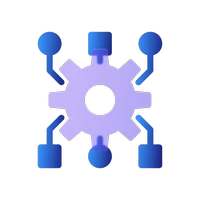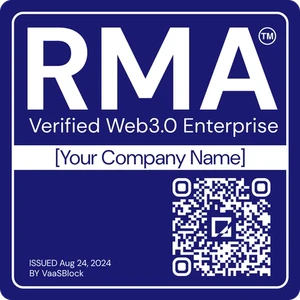
Pinlink
Risk Management
?Risk Management
The RMA™ is a blockchain credibility certification assessing governance, transparency, security, and results, providing trusted verification for businesses in Web3.
VaaSBlock has not audited this project and cannot vouch for this organization.
RMA™ Status: ❌ Unverified
Verification of 6 major compliance criteria.
Technology
?Technology
A collection of public facing information, data collected through partners and our own tools view we present a projects technology in one place for easy verification.
Analysis and testing of tech infrastructures.
Marketing
Alpha?Marketing
Top level look at a projects marketing capablities currently in alpha this section will grow to show quickly how a project promotes itself and the effectiveness.
Screening of user base and community feedback.
Background
?Background
Using multiple public facing sources across the web view a summary of a projects purpose, key achievements and general overview.
Collection of basic administrative documentation.
Risk Management
Last Updated
2025/4/16
Transparency
Transparency Score
Algorithmic assessment of a project’s transparency level, using multiple public data points to measure its commitment to compliance, documentation, and clarity in communication.
Transparency Score
Category Rank
A ranking that positions the organization among its industry peers, evaluating its relative performance based on key compliance, credibility, and transparency indicators.
Category Rank
Pinlink Ai vs RWA
VaaSBlock Rank
A global ranking that compares the organization against all entities listed on VaaSBlock, reflecting its overall credibility, transparency, and operational performance versus the full Web3 ecosystem.
VaaSBlock Rank
Pinlink Ai vs All Listed Organizations
Transparency
Transparency Score
Transparency Score
Algorithmic assessment of a project’s transparency level, using multiple public data points to measure its commitment to compliance, documentation, and clarity in communication.
Category Rank
Pinlink Ai vs RWA
Category Rank
A ranking that positions the organization among its industry peers, evaluating its relative performance based on key compliance, credibility, and transparency indicators.
VaaSBlock Rank
Pinlink Ai vs All Listed Organizations
VaaSBlock Rank
A global ranking that compares the organization against all entities listed on VaaSBlock, reflecting its overall credibility, transparency, and operational performance versus the full Web3 ecosystem.
RMA™
✘ UnverifiedCorporate Governance
The verification of fundamental governance, organizational structure, including verifying the entity’s legal registration and adherence to local laws and regulations.
Corporate
Governance

Team Proficency
Evaluation of an organization’s personnel, ensuring that crucial team members possess the expertise and dedication necessary to execute current business models and scale effectively.
Team
Proficiency

Technology & Security
Assessment of the organization’s technological framework, including blockchain integrations (where relevant), system architecture, and overall IT infrastructure.
Technology
& Security

Revenue Model
Comprehensively evaluation of a company’s income-generating strategies (how do they make or intend to make money), ensuring financial robustness and sustainability.
Revenue
Model

Results Delivered
The Results Delivered component of the RMA™ audit comprehensively evaluates an organization’s ability to achieve its goals and honor its commitments.
Results
Delivered

Planning & Transparency
The Planning and Transparency component of the RMA™ audit offers a thorough assessment of how an organization manages its workflow and prepares for unexpected challenges.
Planning &
Transparency

Technology
Marketing
Marketing Effectiveness
This score assesses the impact of detected marketing activity and the corresponding price movement of a token. The score understands whole market movements to ensure tokens are assessed fairly against peers.
Marketing Effectiveness
Confidence Index
This index determines our confidence in the score we have given. Generally, as more data is collected, the confidence index will increase. If a project has lots of activity, this confidence is earned faster.
Confidence Index
VaaSBlock Rank
This identifies where a project sits compared to all projects accessed for Marketing Effectiveness.
VaaSBlock Rank
Pinlink Ai vs All Listed Organizations
Marketing Effectiveness
Marketing Effectiveness
This score assesses the impact of detected marketing activity and the corresponding price movement of a token. The score understands whole market movements to ensure tokens are assessed fairly against peers.
Confidence Index
Confidence Index
This index determines our confidence in the score we have given. Generally, as more data is collected, the confidence index will increase. If a project has lots of activity, this confidence is earned faster.
VaaSBlock Rank
Pinlink Ai vs All Listed Organizations
VaaSBlock Rank
This identifies where a project sits compared to all projects accessed for Marketing Effectiveness.
No Chain No Gain™ Podcast ⛉
This Organization is yet to join the No Chain No Gain™ Podcast and share insights on what makes their business trustable and innovative.
💡 NCNG generated over 1 Million impressions in its first six months of existence.
PR Impact
PR Impact
VaaSBlock provides estimations to the impact that traditional digital media can have on a project. This is an early release; more areas of PR are planned in future versions.
Search Terms ? Search TermsThese are the terms we discovered the article for on page one of Google. | Est. Traffic ? Estimated TrafficWe estimate how much traffic an article will get. Generally, our estimations are slightly higher than those of more established tools. We are working on the algorithm all the time, and results could change. | Est. Value ? Estimated ValueBased on the estimated traffic we generate an estimation for what this traffic would have cost to generate if you tried to target these users with ads. The positions for the article on google and the location of the traffic are the major factors in this estimation. | |||
|---|---|---|---|---|---|
Pinlink source: Coingecko | Pinlink… — Pinlink source: Coingecko | Organic | coingecko.com | ||
Pinlink source: Coinbase | Pinlink… — Pinlink source: Coinbase | Organic | coinbase.com | ||
Cours Pinlink source: Cryptoast | Cours Pinlink… — Cours Pinlink source: Cryptoast | Organic | cryptoast.fr | ||
What Is source: Bitget | What Is… — What Is source: Bitget | Organic | bitget.com |
| Est. Traffic | Est. Value | ||
|---|---|---|---|
Pinlink… — | |||
Pinlink… — | |||
Cours Pinlink… — | |||
What Is… — |
Background
Organization Name – Pinlink
Category –  RWA
RWA
About
powered by irmaAI
irmaAIPinLink is an RWA-tokenized DePIN marketplace that transforms real-world infrastructure—GPUs, TPUs, CPUs, mining rigs, and storage nodes—into liquid on-chain assets. As one of the first platforms …to combine real-asset tokenization (RWA) with decentralized physical infrastructure networks (DePIN), PinLink enables hardware owners to mint ERC-1155 tokens representing their physical equipment and sell fractional ownership to investors seeking passive income opportunities. These tokenized infrastructure assets can then generate yield as AI developers rent compute capacity through the Pinnacle marketplace.
Designed as a tokenized infrastructure marketplace, PinLink allows two-sided participation:
For Hardware Owners
• Mint tokens representing verified hardware
• Sell full or fractional ownership of physical assets
• Earn long-term rental income when developers use the compute
For AI Developers & Builders
• Access enterprise-grade compute at reduced cost
• Pay rental fees using stablecoins or through optimized PIN-based mechanisms
• Benefit from lower, subsidized costs via PinLink’s Service User Rebate Fund—a pool that redistributes protocol fees to offset developer expenses
Dual-Engine Economic Model
PinLink’s RWA–DePIN hybrid model reduces compute cost for AI builders by combining:
1. Upfront liquidity from fractional asset buyers
2. Ongoing rental revenue generated when developers use the infrastructure
This two-sided capital model stabilizes the ecosystem and enables AI projects to scale compute usage without centralized bottlenecks.
PIN Token Ecosystem
The $PIN token powers governance, incentives, liquidity, and staking. Allocations include:
• ~80% for liquidity & marketplace depth
• 10% for staking rewards
• 10% for protocol treasury
Users may stake $PIN for $sPIN, gaining exposure to marketplace revenue and governance of future listings, DePIN integrations, and asset categories.
Marketplace Growth & Adoption
Since the launch of Pinnacle on Ethereum, PinLink has:
• Deployed $4M+ in tokenized infrastructure assets
• Onboarded tens of thousands of marketplace participants
• Offered up to 40% APR yields on certain verified GPU and mining hardware
• Integrated with AI and compute networks including Fetch.ai, Oasis, and Akash
• Expanded its asset universe toward DePIN-style categories such as WiFi nodes, storage clusters, IoT sensors, distributed cloud servers, and tokenized AI agents
Security & Trust Measures
PinLink employs:
• HackenProof bounty programs
• Vetting pipelines for asset verification
• Transparent tokenization with ERC-1155 provenance
• AI-driven performance optimization via the PinAI layer
The platform remains Unverified on VaaSBlock, meaning it has not yet completed the full RMA™ risk assessment across governance, transparency, and operational controls.
Why PinLink Matters
By merging RWA tokenization with DePIN infrastructure, PinLink offers a real-asset-backed alternative to conventional cloud compute markets—democratizing access to hardware, creating new yield channels for passive investors, and giving AI developers a transparent, permissionless, cost-efficient compute layer. It is one of the first platforms where real physical infrastructure, passive income, and AI workloads converge on-chain.
What is PinLink?
PinLink is an RWA-tokenized DePIN marketplace that turns real-world infrastructure—such as GPUs, TPUs, CPUs and storage nodes—into on-chain assets. Hardware owners mint tokenized infrastructure assets, and investors earn yield when AI developers rent the compute.
How does PinLink’s RWA tokenization model work?
Asset owners tokenize physical hardware using ERC-1155 tokens. These tokens represent fractional ownership and can be held to earn rental income or traded on the marketplace. This creates a crypto marketplace for fractional physical asset ownership with real yield tied to compute demand.
What is the PIN token used for?
The PIN token powers the PinLink economy. It supports liquidity, fee distribution, staking incentives, marketplace rewards, and governance. Staked PIN (sPIN) gives holders a share of protocol revenue and influence over future RWA + DePIN integrations.
Can I buy fractional infrastructure assets on PinLink?
Yes. Through the Pinnacle marketplace, users can buy tokenized GPUs, mining rigs, storage nodes, and other physical infrastructure assets. Investors earn yield when developers use the hardware for AI or compute workloads.
Is PinLink verified by VaaSBlock?
Not yet. PinLink is currently listed as Unverified, meaning it has not completed VaaSBlock’s RMA™ (Risk Management Assessment). Users should conduct independent due diligence.
Who is PinLink designed for?
PinLink primarily serves:
• Hardware owners monetizing idle infrastructure
• AI developers seeking affordable compute
• Investors looking for real-yield RWA exposure
• DePIN builders deploying incentivized hardware networks
Is PinLink a DePIN or an RWA platform?
PinLink operates as a hybrid RWA–DePIN platform:
• RWA = tokenization of real hardware
• DePIN = decentralized networks using those hardware units
This hybrid helps sustain liquidity, yield, and compute supply.
What risks should I consider before interacting with PinLink?
Risks include smart-contract vulnerabilities, asset underutilization, unclear regulation around tokenized infrastructure, and the project’s current Unverified status. As with all RWA and DePIN investments, independent diligence is essential. Read More
Creation Date
February 2026
Headquarters
Unknown
Organization Maturity Level
Early-Stage
RMA™ Type
–
Useful Links
Website – pinlink.ai
Notable Achievements
2025
Pinnacle marketplace live
2025
$4 M+ assets tokenized
2025
PinAI optimization rollout
2025
Service rebate fund active
2025
Fractalia agent tokenization
- vaasblock.com /
- RWA /
- Pinlink














